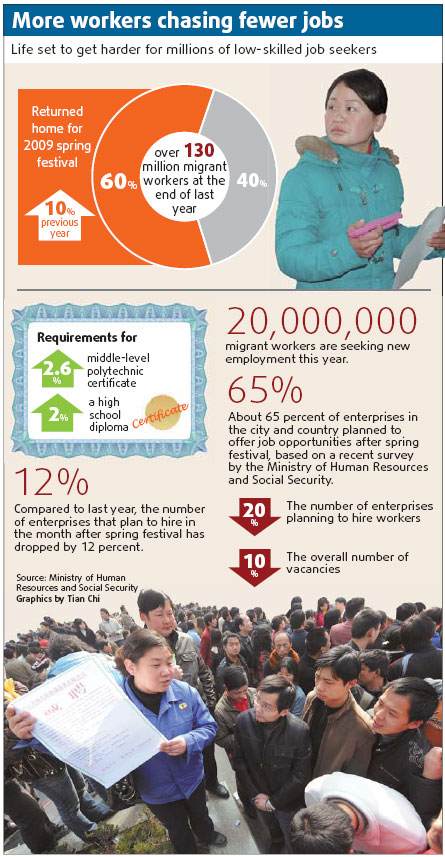
|
BIZCHINA> Top Biz News
 |
|
Should I stay or should I go?
By Qian Yanfeng (China Daily)
Updated: 2009-02-11 07:44
 Hui Xuexing received "the best news of the year" when friends in Beijing told him orders had come in for his renovation team. Fourteen hours later, he was on a train steaming toward the capital. He arrived on February 6, three days earlier than originally planned, and went to work on a household decoration project in southern Beijing together with five fellow workers.
The 32-year-old, a migrant worker from Huizhuang village on the outskirts of Henan's provincial capital, Zhengzhou, leads a team of 10, most of them fellow villagers, working on both household and civic refurbishments.
Previously, since just after the Olympics last year, he couldn't find enough work to feed his workers as the financial crisis bit hard into the construction industry. The downturn prompted him to return forlorn to his hometown in early December, depressed by his failure to bring home the New Year presents - a computer and a refrigerator - he had promised his 12-year-old daughter and wife. "They didn't blame me and comforted me instead," Hui recalled with bitter sadness. "I know how badly my daughter wants a computer, but what can I do? Projects got stalled and payments were held back - I almost earned nothing in the second half of last year."
For any migrant worker like Hui who has spent the past decades toiling in China's southeastern coastal cities to support families back in the rural interior, the anxiety caused by an oversupply of workers within a contracting job market is gut wrenching. In Henan, home to one of China's largest migrant population of nearly 20 million, and also one of the hardest hit areas, nearly 5 million migrant workers returned two weeks before Spring Festival, 60 percent of whom cited the economic downturn as the reason for their extended holiday, according to figures from the provincial labor and social security bureau. A recent survey by China's Ministry of Agriculture also indicated that 15.3 percent of China's 130 million migrant workers, or 20 million, recently lost their jobs. Migrant workers contribute about 40 percent of rural families' income, so job losses in the city means they now face serious financial difficulties at home. Hui is among the lucky few.
Hundreds of migrant workers, all frantic to find work, still line the street at an open-air labor market near Zhengzhou's railway station. Fu Wenzhong, a migrant worker who decided to stay behind for a job at home, said his land was purchased by the government five years ago for construction of a factory. Without land to fall back on, the only choice for him now is to find another job. To help migrant workers, Henan's provincial government has introduced a series of measures to preserve their livelihoods. Apart from subsidies for vocational training in such areas as welding and even computers, migrant workers are also encouraged to start their own businesses, Liu Tao, deputy director of the provincial labor and social security bureau, said. "Pig-raising and bamboo-weaving, for instance, are both good choices," said Liu. The move is also widely regarded as conducive to the development of the inland provinces. (For more biz stories, please visit Industries)
|
||||||